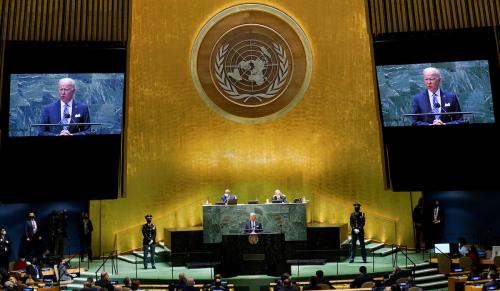The politics of social mobility is heating up, as leading politicians on both sides of the aisle see an opportunity to offer a distinct agenda.
Democrats see government promoting mobility
For Democrats, support for a higher minimum wage and unemployment benefits offer chances to show their support for ordinary Americans, compared to the super-rich who have enjoyed significant income gains in recent years. “An economy that works for all Americans”’ is what the President pledged last month.
Yesterday, Senate Democrats won a small potential victory on behalf of the jobless, squeaking through a bill that would extend emergency unemployment benefits for three months. For Democrats, government is the active ingredient in the promotion of intergenerational mobility, especially through investments in education, labor market regulation, and more progressive taxation.
Republicans see government killing mobility
Meanwhile, Republicans see the 50th birthday of President Lyndon Johnson’s “Great Society” speech as a wake, not a celebration. They say that we waged war on poverty—and poverty won. The official poverty rate is, in fact, very close to the level it was in the late 1960s. Government is the obstacle to opportunity, burdening individuals and companies with too much tax and regulation—and encouraging welfare dependency—rather than promoting independence.
On Monday, at the first annual Social Mobility Summit, we will hear from two leading protagonists. You can Sign up to see Ryan and Gillibrand in action, or watch the webcast.
Gillibrand’s American Opportunity Agenda
Senator Kirsten Gillibrand, our morning keynote speaker, has a five-part plan for what she calls The American Opportunity Agenda:
- Paid Family and Medical Leave
- Increase the Minimum Wage
- Provide Universal Pre-K
- Accessible, Affordable, Quality Childcare
- Equal Pay for Equal Work
Senator Gillibrand says:
“Even before the financial crisis…middle class families were fading away in a growing economic gap. But all along, the basic dreams of the American middle class have not changed. The dream to get an education and a good-paying job, own your own home, raise a family and send your kids to college and have enough at the end of the day for a secure retirement.”
Ryan: Reform Welfare and Foster Civil Society
Representative Paul Ryan will deliver our afternoon keynote. He agrees that the lack of intergenerational mobility is a problem:
“Right now, America’s engines of upward mobility aren’t working the way they should. The question before us today—and it demands a serious answer—is how do we get the engines of upward mobility turned back on, so that no one is left out from the promise of America?”
But for Ryan, the problem is “government-imposed barriers to upward mobility:” debt, taxes, unreformed welfare systems, and fiscally unstable entitlement programs.
Representative Ryan would take the Clinton reforms of the 1990s to the next level, asking more of food stamp recipients, for example, in return for the government’s support; and fostering the institutions of civil society—churches, community groups, voluntary organizations—which are better placed to support individuals than distant bureaucracies.



Commentary
Republicans vs. Democrats: Who Has the Answers on Social Mobility?
January 8, 2014